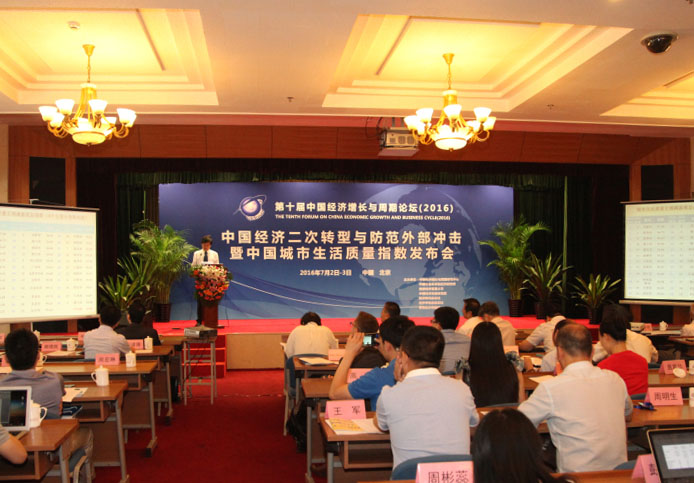Forum on China Economic Growth and Business Cycle / China Urban Life Quality Index Conference

CUEB President Wang Jiaqiong pointed out that 2016 is the first year of China’s “Thirteen Five Year Plan”. The macro-economy is in a “new normal”; economic growth is slowing down; deep-seated problems are yet to be eradicated; structural problems are still salinet. In such a situation where the basic driving force for sustainable economic growth is uncertain, we urgently need a supply-side reform to achieve steady growth, form a new development model and cultivate new momentum to guard against possible external shocks.
Wang Jiaqiong also recalled the history of the development of the forum. He noted that CUEB has closely followed the economic growth, macroeconomic fluctuation and other issues for a long time. Since 2007, 10China Economic Growth and Business Cycle Forum have been held and 9 China's Economic Growth and Economic Cycle have been published. The theme related to each session of the Forum was highly consistent with economic issues at the forefront. Keeping its finger on the pulse of China's macro-economic development, the forum has grown from a small-scale seminar into one with broad international influence, reaching to the academic circles, government decision-making departments, and even to the enterprise community after a decade of hard work and unremitting pursuit. From 2009 on, the Forum launched a special survey of life quality in 35 cities in China to design an index system tailored for Chinese cities. In 2011, the forum started to release Chinese urban life quality index, which was warmly received. Every year, the Forum attracts over 100 press agencies, and is closely followed by international counterparts, the World Bank, IMF and other international organizations, as well as government departments.
After the keynote speech, Professor Zhang Liancheng, Dean of the Chinese Academy of Economic Experimental released the 2016 urban life quality index. It shows that in 2016, the 35 cities nationwide subjective life satisfaction index average is 55.82, slightly higher than that in 2015, in a satisfactory range. The subjective satisfaction index of 35 cities all exceeded the watershed of 50 dividing satisfaction and dissatisfaction. The five sub-indices averages are: the standard of living (60.44), the cost of living (39.74), human capital (62.20), social security (60.66), feelings of life (56.05), and they are improved from 2015. But the cost of living index is still in the unsatisfactory bracket. In addition, the average of life pace index under feelings of life for 35 cities is 44.07, still under the satisfaction line. For the objective index of life quality, (social and economic data index), eastern cities still score higher than the central and western cities, but some cities are trapped in a big gap between subjective and objective indices. In 2016, the average value of the objective social and economic index of 35 cities is54.75, lower than 55.84 in 2015. The objective life quality index has declined compared with last year, the subjective satisfaction index remains basically the same. However, we are still faced with enormous challenges: the high cost of living, the fast pace of life, the uncertain real estate prices and the worrying employment prospects. In the transition process of economic and social development in the future, the central government and local governments at all levels should continue to promote the development of people's livelihood system, stable economic growth and further improve people’s life.
The sub-forum section focused on "the secondary transformation of China's economy and macroeconomic fluctuation", and the Young Scholars Forum was held. Nearly 30 scholars from academic and research institutions of Academy of Social Sciences, the National Development and Reform Commission, the State Council Development Research Center, Peking University, Renmin University of China, Beijing Normal University, Nanjing University, Shanghai University of Finance and Economics made keynote speeches. The scholars believe that, with the release of a strong stimulus after financial crisis, China's economy has gradually entered a long-term slow-down track, and the Chinese economy has to endure pains to achieve its secondary transition. However, the slowdown is conducive to cleansing market through “triple de-” (de-capacity, to inventory, de-stocking and de-leveraging). It also helps promoting supply-side structural reforms and macroeconomic policy adjustments.
Themes of the previous forum respectively are: “Economic Growth and Financial Stability" (2007), “Economic Growth and Inflation" (2008), "World Economic Turmoil and Chinese Economic Sustainable Development" (2009), “Transformation and Policy Choice of China's Economic Growth Path" (2010), “China’s Sustainable Economic Prosperity of Post-crisis Era" (2011),“Macroeconomic Stability and Promoting Structural Reforms"(2012),“China's Macro-economic Development and Transformation Policy Options” (2013), “Economic Growth and Economic Development in Transition Shift”(2014), “New Normal, New Transformation” (2015).
This forum was jointly organized by China's Economic Growth and Cycle Research Center, Institute of Economics of Chinese Academy of Social Sciences, the Capital University of Economics and Business, Institute of Chinese Economic Experimental Research, Economic Research Journal, "Economic Perspective" magazine, HK “Economic Herald” and other units. The forum is honored by the presence of over 200 experts and scholars from the National Bureau of Statistics, National Development and Reform Commission (NDRC), Research and Development Center under the State Council, the Chinese Academy of Social Sciences, Peking University, Renmin University of China, the University of California, San Diego, the University of Florida, Beijing Normal University, Nanjing University, Xiamen University, Shanghai University of Finance and Economics as well as other universities, research institutes at home and abroad.
